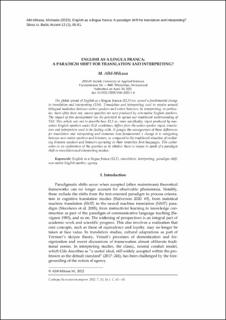Please use this identifier to cite or link to this item:
https://doi.org/10.21256/zhaw-24612Full metadata record
| DC Field | Value | Language |
|---|---|---|
| dc.contributor.author | Albl-Mikasa, Michaela | - |
| dc.date.accessioned | 2022-03-17T09:28:52Z | - |
| dc.date.available | 2022-03-17T09:28:52Z | - |
| dc.date.issued | 2022 | - |
| dc.identifier.issn | 2225-5346 | de_CH |
| dc.identifier.uri | https://digitalcollection.zhaw.ch/handle/11475/24612 | - |
| dc.description.abstract | The global spread of English as a lingua franca (ELF) has caused a fundamental change to translation and interpreting (T&I). Translation and interpreting used to revolve around bilingual mediation between native speakers and native listeners. In interpreting, in particular, more often than not, source speeches are now produced by non-native English speakers. The impact of this development has the potential to uproot our traditional understanding of T&I. This article sets out to describe how ELF or, more specifically, input produced by nonnative English speakers under ELF conditions, differs from the native-speaker input, translators and interpreters used to be dealing with. It gauges the consequences of these differences for translation and interpreting and examines how fundamental a change it is navigating between non-native speakers and listeners, as compared to the traditional situation of mediating between speakers and listeners operating in their respective first languages. This culminates in an exploration of the question as to whether there is reason to speak of a paradigm shift in translation and interpreting studies. | de_CH |
| dc.language.iso | en | de_CH |
| dc.publisher | Immanuel Kant Baltic Federal University Press | de_CH |
| dc.relation.ispartof | Slovo.ru: Baltic accent | de_CH |
| dc.rights | https://creativecommons.org/licenses/by/4.0/ | de_CH |
| dc.subject | English as a lingua franca | de_CH |
| dc.subject | Translation | de_CH |
| dc.subject | Interpreting | de_CH |
| dc.subject | Paradigm shift | de_CH |
| dc.subject | Non-native English speaker | de_CH |
| dc.subject | Agency | de_CH |
| dc.subject.ddc | 418.02: Translationswissenschaft | de_CH |
| dc.subject.ddc | 420: Englisch | de_CH |
| dc.title | English as a lingua franca – a paradigm shift for translation and interpreting | de_CH |
| dc.type | Beitrag in wissenschaftlicher Zeitschrift | de_CH |
| dcterms.type | Text | de_CH |
| zhaw.departement | Angewandte Linguistik | de_CH |
| zhaw.organisationalunit | Institut für Übersetzen und Dolmetschen (IUED) | de_CH |
| dc.identifier.doi | 10.5922/2225-5346-2022-1-4 | de_CH |
| dc.identifier.doi | 10.21256/zhaw-24612 | - |
| zhaw.funding.eu | No | de_CH |
| zhaw.issue | 1 | de_CH |
| zhaw.originated.zhaw | Yes | de_CH |
| zhaw.pages.end | 81 | de_CH |
| zhaw.pages.start | 65 | de_CH |
| zhaw.publication.status | publishedVersion | de_CH |
| zhaw.volume | 13 | de_CH |
| zhaw.publication.review | Peer review (Publikation) | de_CH |
| zhaw.webfeed | Dolmetschwissenschaft | de_CH |
| zhaw.author.additional | No | de_CH |
| zhaw.display.portrait | Yes | de_CH |
| Appears in collections: | Publikationen Angewandte Linguistik | |
Files in This Item:
| File | Description | Size | Format | |
|---|---|---|---|---|
| 2022_Albl-Mikasa_ELF-paradigm-shift-for-T-and-I.pdf | 373.84 kB | Adobe PDF |  View/Open |
Show simple item record
Albl-Mikasa, M. (2022). English as a lingua franca – a paradigm shift for translation and interpreting. Slovo.ru: Baltic Accent, 13(1), 65–81. https://doi.org/10.5922/2225-5346-2022-1-4
Albl-Mikasa, M. (2022) ‘English as a lingua franca – a paradigm shift for translation and interpreting’, Slovo.ru: Baltic accent, 13(1), pp. 65–81. Available at: https://doi.org/10.5922/2225-5346-2022-1-4.
M. Albl-Mikasa, “English as a lingua franca – a paradigm shift for translation and interpreting,” Slovo.ru: Baltic accent, vol. 13, no. 1, pp. 65–81, 2022, doi: 10.5922/2225-5346-2022-1-4.
ALBL-MIKASA, Michaela, 2022. English as a lingua franca – a paradigm shift for translation and interpreting. Slovo.ru: Baltic accent. 2022. Bd. 13, Nr. 1, S. 65–81. DOI 10.5922/2225-5346-2022-1-4
Albl-Mikasa, Michaela. 2022. “English as a Lingua Franca – a Paradigm Shift for Translation and Interpreting.” Slovo.ru: Baltic Accent 13 (1): 65–81. https://doi.org/10.5922/2225-5346-2022-1-4.
Albl-Mikasa, Michaela. “English as a Lingua Franca – a Paradigm Shift for Translation and Interpreting.” Slovo.ru: Baltic Accent, vol. 13, no. 1, 2022, pp. 65–81, https://doi.org/10.5922/2225-5346-2022-1-4.
Items in DSpace are protected by copyright, with all rights reserved, unless otherwise indicated.